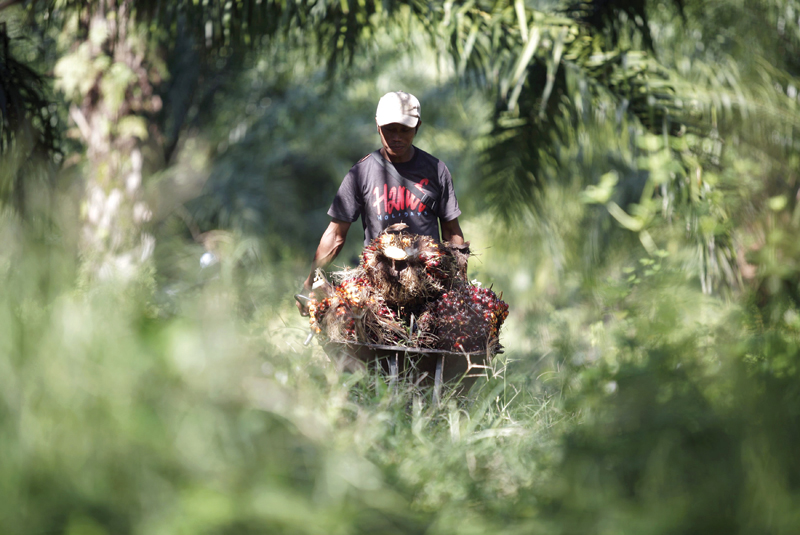

Michael Taylor -
Europe, the world’s second-biggest buyer of palm oil, is set to miss a 2020 target backed by about 10 countries, as well as big companies, to use 100 per cent sustainable supplies of the edible oil in food ingredients, environmental experts warn.
A lack of public awareness and debate around the palm oil industry has left nations like Italy, Spain and Poland lagging behind their neighbours in green palm oil purchases, a January report by The Sustainable Trade Initiative (IDH) said.

“Countries in northwestern Europe are leading the pack,” said Daan Wensing, a director at IDH, a Netherlands-based nonprofit. “Other major destinations are just getting started.” In addition to a lack of government action to force buyers to purchase sustainable palm oil, Wensing said European catering firms and animal feed companies are not coming under consumer pressure to source greener supplies.
“The industries that are consumer-facing have stepped up, but sectors like canteen catering services are not really playing ball yet,” he said.
As the world’s most widely used edible oil, palm oil is found in everything from margarine to biscuits and soap to soups, as well as in biofuel.
But in recent years, the industry has come under close scrutiny from green activists and consumers, who have blamed it for clearing forests for plantations and causing fires, along with the exploitation of workers.
In response, about 10 European governments — including France, the Netherlands and Britain — and major corporate buyers of palm oil like Nestle, Mondelez, PepsiCo and Unilever pledged to purchase only sustainable palm oil by 2020.
The European Union has also approved a law to phase out palm oil-based biofuels by 2030, causing outrage in top producer nations Indonesia and Malaysia.
But with less than two years to go until the end of 2020, only 74 per cent of palm oil bought by Europe’s food industry was certified as sustainable, the IDH report said.
“To meet the 100 per cent target by 2020 is going to be very difficult because now we move into these markets where there is no consumer pressure or awareness,” said Wensing.
CART BEFORE HORSE
Palm oil certified as sustainable by the global industry watchdog, the Roundtable on Sustainable Palm Oil (RSPO), accounts for about a fifth of global output, at an estimated 12.3 million tonnes per year.
It sells at a premium but demand covers just half of supply.
Europe imported an estimated 7 million tonnes of palm oil in 2017, according to consultancy LMC International, with about 2.6 million tonnes of that used for food production.
Anne Rosenbarger, Southeast Asia commodities manager at the World Resources Institute Indonesia, said the debate around palm oil had often been politicised, further confusing consumers.
British supermarket chain Iceland, for example, said last year it would remove palm oil from its own-brand food by the end of 2018 as part of efforts to stem deforestation.
The retailer was then banned from showing a palm oil-themed Christmas advert on television because it was deemed to breach political advertising rules.
Such controversies around palm-oil boycotts are making major brands wary of using the RSPO logo on their products and drawing attention to their use of palm oil, said Rosenbarger.
Building greater awareness of sustainable palm oil and the RSPO among consumers would encourage more food makers to use the trademark on their products, she added.
Improving transparency around the way the RSPO applies its standards and handles complaints would also help convince more brands to use the logo, researchers said.
The RSPO is backed by major European buyers and has more than 4,000 members, including producers, traders, consumer goods firms and green groups.
Even if the “extremely ambitious” 2020 targets set by European buyers fall short, they were required to drive the transformation seen in companies over the last few years, said Rosenbarger, who is also co-chair of the RSPO.
“There was a little bit of cart before the horse, but that’s part of the growing pains of what needed to happen,” she said.
NO DEFORESTATION
While many companies have put in place sustainable palm oil policies, action and implementation have often been lacking throughout supply chains, said Grant Rosoman, Asia-Pacific campaign advisor at Greenpeace International.
He said it was unlikely the 2020 goals would be met because “no deforestation” commitments take years to implement.
“A lot of the big traders and buyers just don’t want to pay enough for what it takes to do proper, responsibly produced palm oil,” he said.
European countries that have pledged to buy only sustainable palm oil should enforce those commitments even if they are just refining or taking port deliveries of palm oil to be delivered across Europe, said IDH’s Wensing.
He called on more European governments to make the 2020 pledge on sustainable palm oil, and for more awareness campaigns to change consumer attitudes and demand.
“Governments need to step up their game to make sure it (sustainable palm oil) is the norm in Europe,” he said.
Palm oil buyers should also get more involved on the ground to ensure that their supplies are not linked to deforestation or abuse of workers’ rights, he added.
If Europe leads the way in buying only green palm oil, it could set a precedent for other major consuming countries like Indonesia, China and India, said David Gaveau, a scientist at the Indonesia-based Centre for International Forestry Research.
But much work remains to convince others outside Europe to put the environment ahead of price, said experts.
“Palm oil consumers are starting to care in the United States, and quite a bit of RSPO palm (oil) is now entering the US markets,” Carl Bek-Nielsen, chief executive director at Malaysia’s United Plantations Berhad, said by email.
“In India and China, interest is slowly gaining momentum but there is still a fair way to go.” — Reuters
Oman Observer is now on the WhatsApp channel. Click here



